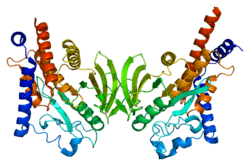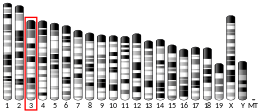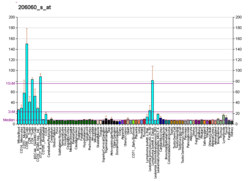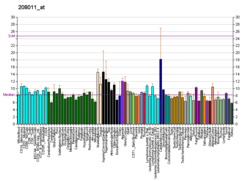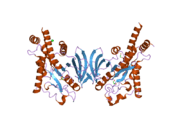PTPN22
Protein tyrosine phosphatase, non-receptor type 22 (lymphoid), also known as PTPN22, is a protein that in humans is encoded by the PTPN22 gene.[5][6][7] This gene can be expressed in different forms. PTPN22 affects the responsiveness of T and B cell receptors, and mutations are associated with increases or decreases in risks of autoimmune diseases.
Molecular biology
The gene is located on the short arm of Chromosome 1 near the centromere (1p13.2) on the Crick (minus) strand. It is 57,898 bases in length and encodes a protein of 807 amino acids (molecular weight 91,705 Da). There are 24 exons in the gene and 21 transcript variants encoding 10 distinct proteins are known. The proteins are located in the cytoplasm.
Function
This gene encodes a protein tyrosine phosphatase which is expressed primarily in lymphoid tissues. This enzyme is involved in several signalling pathways associated with the immune response. Based on models of the murine phosphatase,[8][9] structural identification,[10] and human genetics[11] the phosphatase forms complexes with C-src tyrosine kinase (Csk), associated with the control of Src family members. The mutation Arg620Trp disrupts binding to Csk, alters the responsiveness of T and B cell receptors, and is associated with autoimmune diseases. There are other suggestions that the phosphatase regulates CBL function in the T cell receptor signaling pathway.[5] Other interactions are likely.
Disease association
The common 1858T (rs2476601) Arg620Trp nonsynonymous single nucleotide polymorphism located in the PTPN22 gene has been associated with autoimmune disorders, including an increased risk of Type 1 Diabetes, rheumatoid arthritis, lupus, Vitiligo and Graves' disease, but a decreased risk of Crohn's disease.[12][13]
A recent study suggests that the mutation does not, on a population basis, reduce life span.[14] The mutation may be conserved in human evolution because it may provide a hyper-immune response to infectious disease.[15]
Mutations in PTPN22 are over-represented in breast cancer.[16]
References
- GRCh38: Ensembl release 89: ENSG00000134242 - Ensembl, May 2017
- GRCm38: Ensembl release 89: ENSMUSG00000027843 - Ensembl, May 2017
- "Human PubMed Reference:". National Center for Biotechnology Information, U.S. National Library of Medicine.
- "Mouse PubMed Reference:". National Center for Biotechnology Information, U.S. National Library of Medicine.
- EntrezGene 26191
- Matthews RJ, Bowne DB, Flores E, Thomas ML (May 1992). "Characterization of hematopoietic intracellular protein tyrosine phosphatases: description of a phosphatase containing an SH2 domain and another enriched in proline-, glutamic acid-, serine-, and threonine-rich sequences". Mol. Cell. Biol. 12 (5): 2396–405. doi:10.1128/mcb.12.5.2396. PMC 364412. PMID 1373816.
- Cohen S, Dadi H, Shaoul E, Sharfe N, Roifman CM (March 1999). "Cloning and characterization of a lymphoid-specific, inducible human protein tyrosine phosphatase, Lyp". Blood. 93 (6): 2013–24. doi:10.1182/blood.V93.6.2013.406k25_2013_2024. PMID 10068674.
- Cloutier JF, Veillette A (September 1996). "Association of inhibitory tyrosine protein kinase p50csk with protein tyrosine phosphatase PEP in T cells and other hemopoietic cells". EMBO J. 15 (18): 4909–18. doi:10.1002/j.1460-2075.1996.tb00871.x. PMC 452228. PMID 8890164.
- Gregorieff A, Cloutier JF, Veillette A (May 1998). "Sequence requirements for association of protein-tyrosine phosphatase PEP with the Src homology 3 domain of inhibitory tyrosine protein kinase p50(csk)". J. Biol. Chem. 273 (21): 13217–22. doi:10.1074/jbc.273.21.13217. PMID 9582365.
- Ghose R, Shekhtman A, Goger MJ, Ji H, Cowburn D (November 2001). "A novel, specific interaction involving the Csk SH3 domain and its natural ligand". Nat. Struct. Biol. 8 (11): 998–1004. doi:10.1038/nsb1101-998. PMID 11685249.
- Vang T, Miletic AV, Bottini N, Mustelin T (September 2007). "Protein tyrosine phosphatase PTPN22 in human autoimmunity". Autoimmunity. 40 (6): 453–61. doi:10.1080/08916930701464897. PMID 17729039.
- Qu H, Tessier MC, Hudson TJ, Polychronakos C (March 2005). "Confirmation of the association of the R620W polymorphism in the protein tyrosine phosphatase PTPN22 with type 1 diabetes in a family based study". J. Med. Genet. 42 (3): 266–70. doi:10.1136/jmg.2004.026971. PMC 1736025. PMID 15744042.
- Vang T, Congia M, Macis MD, Musumeci L, Orrú V, Zavattari P, Nika K, Tautz L, Taskén K, Cucca F, Mustelin T, Bottini N (December 2005). "Autoimmune-associated lymphoid tyrosine phosphatase is a gain-of-function variant". Nat. Genet. 37 (12): 1317–9. doi:10.1038/ng1673. PMID 16273109.
- Napolioni V, Natali A, Saccucci P, Lucarini N (August 2011). "PTPN22 1858C>T (R620W) functional polymorphism and human longevity". Mol. Biol. Rep. 38 (6): 4231–5. doi:10.1007/s11033-010-0546-8. PMID 21113673.
- "PTPN22". NLM (US Gov). Retrieved 5 April 2013.
- Koboldt DC (2012). "Comprehensive molecular portraits of human breast tumours". Nature. Nature Publishing Group. 490 (7418): 61–70. doi:10.1038/nature11412. PMC 3465532. PMID 23000897.
Further reading
- Gregersen PK (2005). "Pathways to gene identification in rheumatoid arthritis: PTPN22 and beyond". Immunol. Rev. 204: 74–86. doi:10.1111/j.0105-2896.2005.00243.x. PMID 15790351.
- Brand O, Gough S, Heward J (2005). "HLA , CTLA-4 and PTPN22 : the shared genetic master-key to autoimmunity?". Expert Rev Mol Med. 7 (23): 1–15. doi:10.1017/S1462399405009981. PMID 16229750.
- Bottini N, Vang T, Cucca F, Mustelin T (2006). "Role of PTPN22 in type 1 diabetes and other autoimmune diseases". Semin. Immunol. 18 (4): 207–13. doi:10.1016/j.smim.2006.03.008. PMID 16697661.
- Gjörloff-Wingren, A.; Saxena, M.; Han, S.; Wang, X.; Alonso, A.; Renedo, M.; Oh, P.; Williams, S.; Schnitzer, J.; Mustelin, T. (2000). "Subcellular localization of intracellular protein tyrosine phosphatases in T cells". European Journal of Immunology. 30 (8): 2412–2421. doi:10.1002/1521-4141(2000)30:8<2412::AID-IMMU2412>3.0.CO;2-J. PMID 10940933.
- Hill RJ, Zozulya S, Lu YL, Ward K, Gishizky M, Jallal B (2002). "The lymphoid protein tyrosine phosphatase Lyp interacts with the adaptor molecule Grb2 and functions as a negative regulator of T-cell activation". Exp. Hematol. 30 (3): 237–44. doi:10.1016/S0301-472X(01)00794-9. PMID 11882361.
- Chien W, Tidow N, Williamson EA, Shih LY, Krug U, Kettenbach A, Fermin AC, Roifman CM, Koeffler HP (2003). "Characterization of a myeloid tyrosine phosphatase, Lyp, and its role in the Bcr-Abl signal transduction pathway". J. Biol. Chem. 278 (30): 27413–20. doi:10.1074/jbc.M304575200. PMID 12764153.
- Bottini N, Musumeci L, Alonso A, Rahmouni S, Nika K, Rostamkhani M, MacMurray J, Meloni GF, Lucarelli P, Pellecchia M, Eisenbarth GS, Comings D, Mustelin T (2004). "A functional variant of lymphoid tyrosine phosphatase is associated with type I diabetes". Nat. Genet. 36 (4): 337–8. doi:10.1038/ng1323. PMID 15004560.
- Begovich AB, Carlton VE, Honigberg LA, Schrodi SJ, Chokkalingam AP, Alexander HC, Ardlie KG, Huang Q, Smith AM, Spoerke JM, Conn MT, Chang M, Chang SY, Saiki RK, Catanese JJ, Leong DU, Garcia VE, McAllister LB, Jeffery DA, Lee AT, Batliwalla F, Remmers E, Criswell LA, Seldin MF, Kastner DL, Amos CI, Sninsky JJ, Gregersen PK (2004). "A missense single-nucleotide polymorphism in a gene encoding a protein tyrosine phosphatase (PTPN22) is associated with rheumatoid arthritis". Am. J. Hum. Genet. 75 (2): 330–7. doi:10.1086/422827. PMC 1216068. PMID 15208781.
- Kyogoku C, Langefeld CD, Ortmann WA, Lee A, Selby S, Carlton VE, Chang M, Ramos P, Baechler EC, Batliwalla FM, Novitzke J, Williams AH, Gillett C, Rodine P, Graham RR, Ardlie KG, Gaffney PM, Moser KL, Petri M, Begovich AB, Gregersen PK, Behrens TW (2004). "Genetic association of the R620W polymorphism of protein tyrosine phosphatase PTPN22 with human SLE". Am. J. Hum. Genet. 75 (3): 504–7. doi:10.1086/423790. PMC 1182029. PMID 15273934.
- Smyth D, Cooper JD, Collins JE, Heward JM, Franklyn JA, Howson JM, Vella A, Nutland S, Rance HE, Maier L, Barratt BJ, Guja C, Ionescu-Tîrgoviste C, Savage DA, Dunger DB, Widmer B, Strachan DP, Ring SM, Walker N, Clayton DG, Twells RC, Gough SC, Todd JA (2004). "Replication of an association between the lymphoid tyrosine phosphatase locus (LYP/PTPN22) with type 1 diabetes, and evidence for its role as a general autoimmunity locus". Diabetes. 53 (11): 3020–3. doi:10.2337/diabetes.53.11.3020. PMID 15504986.
- Ladner MB, Bottini N, Valdes AM, Noble JA (2005). "Association of the single nucleotide polymorphism C1858T of the PTPN22 gene with type 1 diabetes". Hum. Immunol. 66 (1): 60–4. doi:10.1016/j.humimm.2004.09.016. PMID 15620463.
- Orozco G, Sánchez E, González-Gay MA, López-Nevot MA, Torres B, Cáliz R, Ortego-Centeno N, Jiménez-Alonso J, Pascual-Salcedo D, Balsa A, de Pablo R, Nuñez-Roldan A, González-Escribano MF, Martín J (January 2005). "Association of a functional single-nucleotide polymorphism of PTPN22, encoding lymphoid protein phosphatase, with rheumatoid arthritis and systemic lupus erythematosus". Arthritis Rheum. 52 (1): 219–24. doi:10.1002/art.20771. PMID 15641066.
- Steer S, Lad B, Grumley JA, Kingsley GH, Fisher SA (2005). "Association of R602W in a protein tyrosine phosphatase gene with a high risk of rheumatoid arthritis in a British population: evidence for an early onset/disease severity effect". Arthritis Rheum. 52 (1): 358–60. doi:10.1002/art.20737. PMID 15641088.
- Zheng W, She JX (2005). "Genetic association between a lymphoid tyrosine phosphatase (PTPN22) and type 1 diabetes". Diabetes. 54 (3): 906–8. doi:10.2337/diabetes.54.3.906. PMID 15734872.
- Zhernakova A, Eerligh P, Wijmenga C, Barrera P, Roep BO, Koeleman BP (2005). "Differential association of the PTPN22 coding variant with autoimmune diseases in a Dutch population". Genes Immun. 6 (6): 459–61. doi:10.1038/sj.gene.6364220. PMID 15875058.
External links
Overview of all the structural information available in the PDB for UniProt: Q9Y2R2 (Tyrosine-protein phosphatase non-receptor type 22) at the PDBe-KB.
